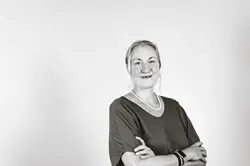CDC behavioral scientist passes institutional wisdom to mentees
Meet Candace Rutt

Dr. Rutt started her career at the CDC as an ORISE fellow in the Division of Nutrition, Physical Activity and Obesity. Rutt is now part of the Waterborne Disease Prevention Branch at CDC, working on topics like Water, Sanitation and Hygiene, Harmful Algal Blooms and Antibiotic Resistance among others.
Candace Rutt, Ph.D., can pinpoint the moment she became interested in the health field. She remembers being a young child visiting her grandfather in the hospital after his open-heart surgery. The details of the surgery stuck out to her and made her fascinated with general health promotion and prevention. She wanted to learn the reasons behind people’s decisions regarding personal health and to help people make the right choices.
This interest in health decisions led Dr. Rutt to pursue a bachelor’s degree in psychology from Michigan State University and a master’s degree in psychology from the University of Texas at El Paso (UTEP). During her time in the applied health doctoral program at UTEP, Dr. Rutt concurrently started a Master of Public Health program. While she didn’t finish her Master of Public Health degree due to her being offered an ORISE opportunity at the U.S. Centers for Disease Control and Prevention (CDC), the experience was still a key moment for Dr. Rutt’s future in the field.
“This is when I knew I wanted to work in public health at CDC where I could have a national impact on promoting public health using behavioral science,” Dr. Rutt says.
Dr. Rutt started her career at the CDC as an ORISE fellow in the Division of Nutrition, Physical Activity and Obesity.
The CDC Research Participation Programs are educational and training programs designed to provide students, recent graduates and university faculty opportunities to participate in project-specific CDC research, current public health research and developmental activities.
Looking back on those first few years of her career (now affectionally referred to as “the golden years” by her and some of her longtime colleagues), Dr. Rutt fondly remembers her time as an ORISE fellow.
“I had an amazing mentor who was always super supportive, extremely motivational and ‘gently’ nudged us to do amazing work,” she says.
Dr. Rutt decided to be a mentor herself to train the next generation of behavioral scientists. She loves working with her “academic children” and finds it incredibly rewarding to see them grow into successful scientists. Dr. Rutt’s impetus to become a mentor stemmed from her own experiences as a scientist, both positive and negative.
“I have had a lot of mentors and supervisors during my 20-year career, and I try to emulate my favorites and pass along the passion for public health,” she explains. “I have also worked with some ‘I would never recommend’ supervisors and I consciously make sure that I don’t repeat or pass on the negative aspects that I encountered.”
Dr. Rutt is now part of the Waterborne Disease Prevention Branch at CDC, working on topics like Water, Sanitation and Hygiene, Harmful Algal Blooms and Antibiotic Resistance among others.
Dr. Rutt’s work is focused on bridging the gap between behavioral science and infectious disease. Her typical day is spent somewhere in the publication process including literature reviews, study design, data collection/analysis and writing. This gives Dr. Rutt ample opportunity to work with her mentees to develop these necessary skills to promote understanding of behavioral science and improve public health.
“Depending on what point we are at in the various projects, I work with my mentee to assign them various aspects of the projects to lead,” she explains. “I make sure their workload is manageable and that they enjoy what they are working on.”
Dr. Rutt remembers what it was like to start out at the CDC as an ORISE fellow, and her wealth of experience means that she has lessons to pass along and great stories to tell. Her favorite part of the mentoring process is watching her mentees learn new skills and grow as professionals.
“It is always fascinating to see what they do after their fellowship ends!” Dr. Rutt explains.
A self-described “hippie at heart,” Rutt spends her time outside of work by ennjoying nature and walking her pup, Xena. One gathers that this is the same spirit that allows her to bond with her mentees.
Dr. Rutt’s first mentor at CDC helped her navigate the excitement of her early career. She hopes, now, to do the same for others in the public health field.
The CDC Research Participation Program is managed by the Oak Ridge Institute for Science and Education (ORISE) under an agreement between CDC and the U.S. Department of Energy (DOE). ORISE is managed for DOE by ORAU.

